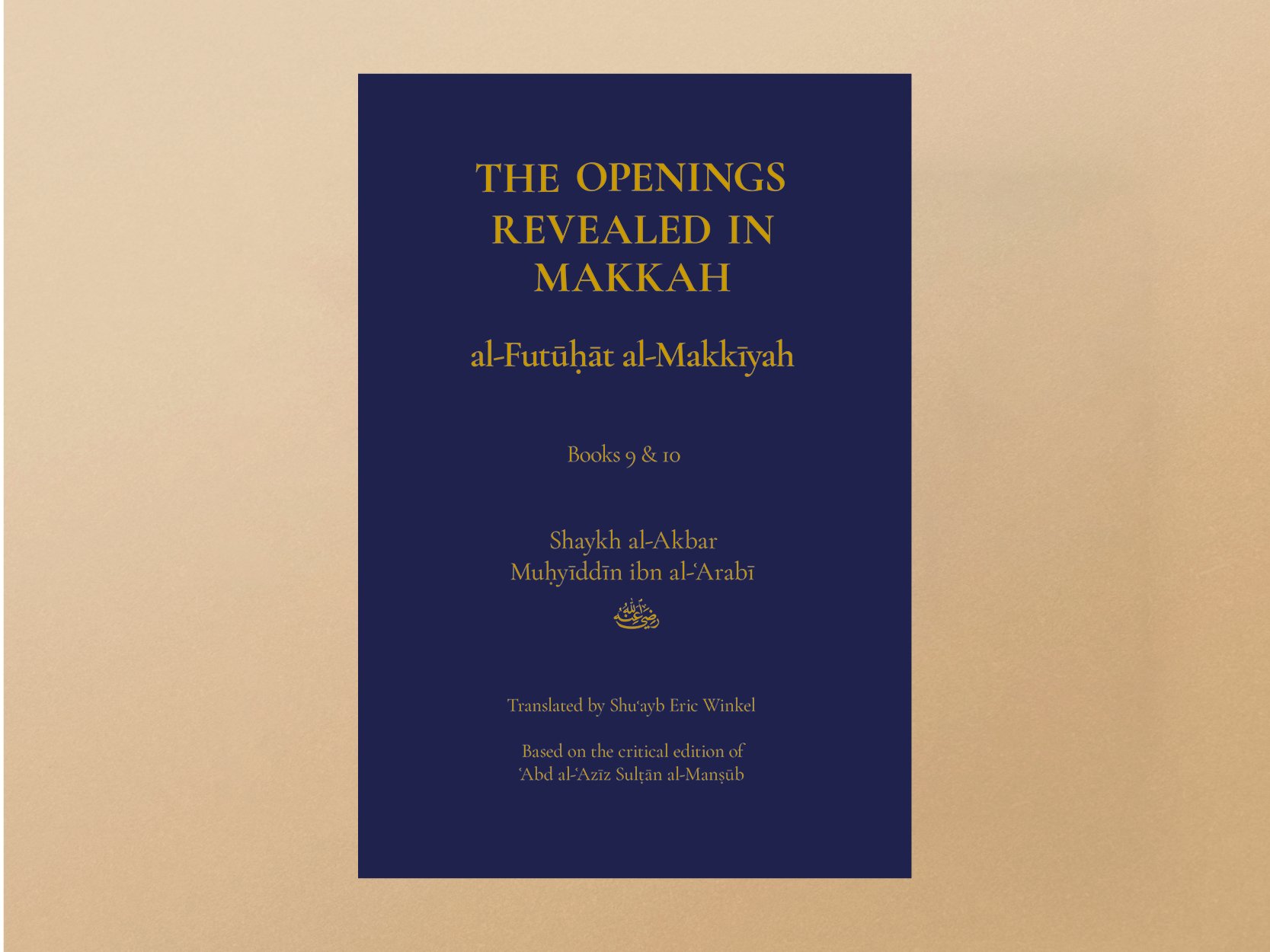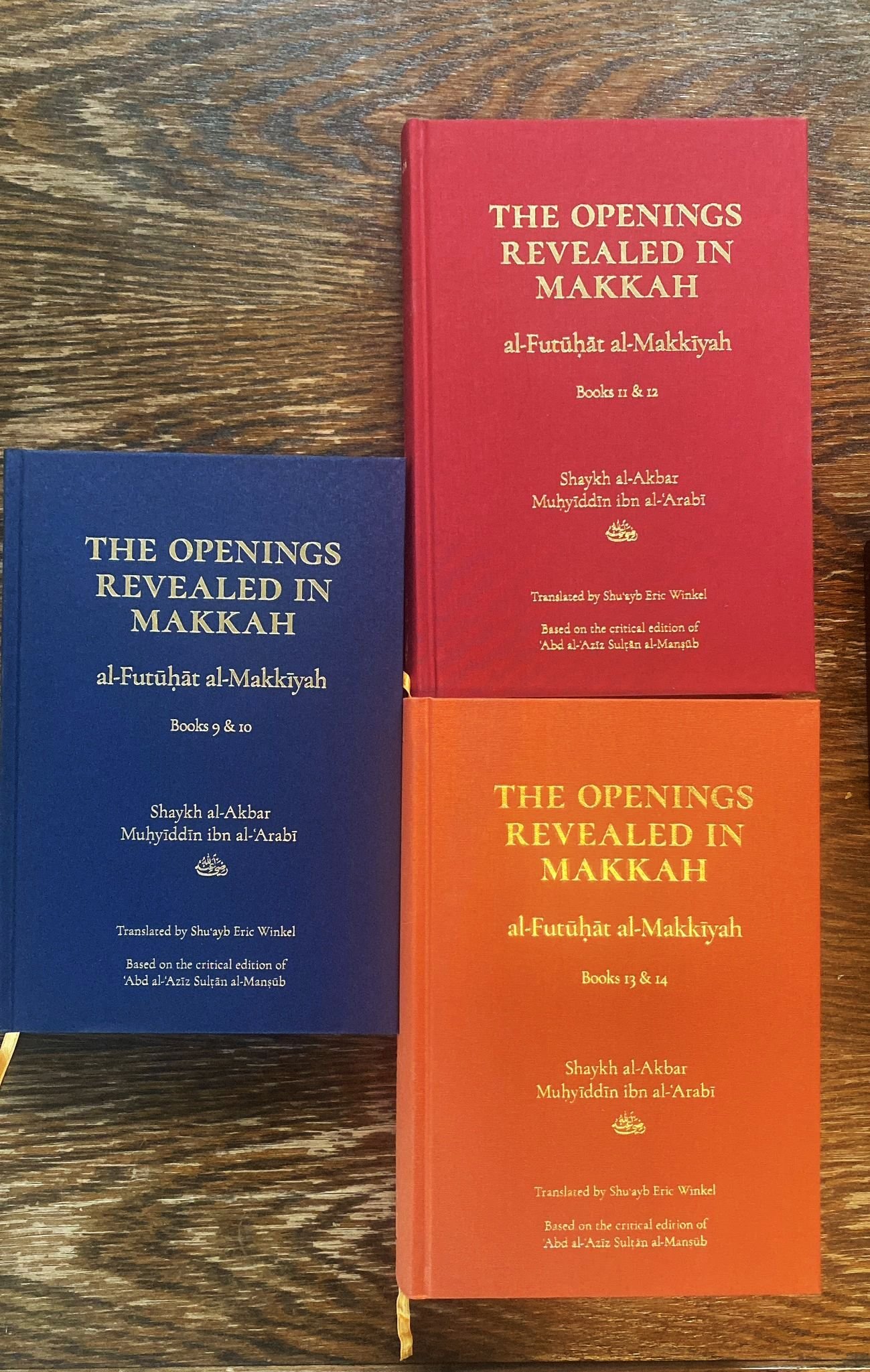 Image 1 of 5
Image 1 of 5

 Image 2 of 5
Image 2 of 5

 Image 3 of 5
Image 3 of 5

 Image 4 of 5
Image 4 of 5

 Image 5 of 5
Image 5 of 5






New Launch: Volumes 5, 6, 7 Bundle: The Openings Revealed in Makkah - FREE WORLDWIDE SHIPPING
Enjoy FREE WORLDWIDE SHIPPING
Discount code: BUNDLEFREESHIPPING288
Volumes 5, 6, and 7 are hardback editions and contain books 9 to 14. These bundle together contain 2,012 pages!
Volume 5 (Books 9 & 10) contain the last three of the five pillars of Islam: charity, fasting, and pilgrimage. Ibn al-ʿArabī goes through each of the traditional associated legal issues. From simply the legal perspective, his treatment is unique: he looks at the wide range of legal positions, including views from all the schools of law (such as Hanafi, Hanbali). And he goes even farther – he examines not just the great variety of positions but takes each into the ‘inward’ dimension. What are the inward, spiritual, psychological, and meaningful insights for each outward ritual? With his perspective, we find unexpected connections and linkages. The rituals become full of meaning as each outward aspect and gesture is connected to a spiritual, emotional, and psychological truth inside us.
Volume 6 (Books 11 & 12) moves along the previous topic of pilgrimage and examines and draws insights for us from ḥadīth concerning pilgrimage – for example, the sixteenth ḥadīth on why the woman does not cover her face during the pilgrimage. This area leads to ḥadīth about Makkah and Madīnah and their special features. Next comes the count: the list of special beings – for example, the persons who suddenly flourish during the month of Rajab, and the great ones who are abased and humble and utterly dependent on God, and the ones who renounce the worlds – including Ibn al-ʿArabī’s uncle and his story. This brings us to the 155 questions of Ḥakīm al-Tirmidhī, the test to see who has truly received tastings into 155 mysteries.
Volume 7 (Books 13 & 14) continues with the 155 questions, and contains Ibn al-ʿArabī’s rhythmical list of ṣūfī terms prompted at the 153rd question. With the end of the 155 questions comes the end – with answers in abbreviated form, as Ibn al-ʿArabī’s informs us! – of the first of the six sections of The Openings Revealed in Makkah etched in light in the body of the Youth. Now he commences with the opposites: the truth of turning for forgiveness, and abandoning the turn for forgiveness; the truth of patience, and the abandoning of patience. We enter the world of vast unendingness, where we turn from and to, and to God and to God and yet again to God.
Enjoy FREE WORLDWIDE SHIPPING
Discount code: BUNDLEFREESHIPPING288
Volumes 5, 6, and 7 are hardback editions and contain books 9 to 14. These bundle together contain 2,012 pages!
Volume 5 (Books 9 & 10) contain the last three of the five pillars of Islam: charity, fasting, and pilgrimage. Ibn al-ʿArabī goes through each of the traditional associated legal issues. From simply the legal perspective, his treatment is unique: he looks at the wide range of legal positions, including views from all the schools of law (such as Hanafi, Hanbali). And he goes even farther – he examines not just the great variety of positions but takes each into the ‘inward’ dimension. What are the inward, spiritual, psychological, and meaningful insights for each outward ritual? With his perspective, we find unexpected connections and linkages. The rituals become full of meaning as each outward aspect and gesture is connected to a spiritual, emotional, and psychological truth inside us.
Volume 6 (Books 11 & 12) moves along the previous topic of pilgrimage and examines and draws insights for us from ḥadīth concerning pilgrimage – for example, the sixteenth ḥadīth on why the woman does not cover her face during the pilgrimage. This area leads to ḥadīth about Makkah and Madīnah and their special features. Next comes the count: the list of special beings – for example, the persons who suddenly flourish during the month of Rajab, and the great ones who are abased and humble and utterly dependent on God, and the ones who renounce the worlds – including Ibn al-ʿArabī’s uncle and his story. This brings us to the 155 questions of Ḥakīm al-Tirmidhī, the test to see who has truly received tastings into 155 mysteries.
Volume 7 (Books 13 & 14) continues with the 155 questions, and contains Ibn al-ʿArabī’s rhythmical list of ṣūfī terms prompted at the 153rd question. With the end of the 155 questions comes the end – with answers in abbreviated form, as Ibn al-ʿArabī’s informs us! – of the first of the six sections of The Openings Revealed in Makkah etched in light in the body of the Youth. Now he commences with the opposites: the truth of turning for forgiveness, and abandoning the turn for forgiveness; the truth of patience, and the abandoning of patience. We enter the world of vast unendingness, where we turn from and to, and to God and to God and yet again to God.
Enjoy FREE WORLDWIDE SHIPPING
Discount code: BUNDLEFREESHIPPING288
Volumes 5, 6, and 7 are hardback editions and contain books 9 to 14. These bundle together contain 2,012 pages!
Volume 5 (Books 9 & 10) contain the last three of the five pillars of Islam: charity, fasting, and pilgrimage. Ibn al-ʿArabī goes through each of the traditional associated legal issues. From simply the legal perspective, his treatment is unique: he looks at the wide range of legal positions, including views from all the schools of law (such as Hanafi, Hanbali). And he goes even farther – he examines not just the great variety of positions but takes each into the ‘inward’ dimension. What are the inward, spiritual, psychological, and meaningful insights for each outward ritual? With his perspective, we find unexpected connections and linkages. The rituals become full of meaning as each outward aspect and gesture is connected to a spiritual, emotional, and psychological truth inside us.
Volume 6 (Books 11 & 12) moves along the previous topic of pilgrimage and examines and draws insights for us from ḥadīth concerning pilgrimage – for example, the sixteenth ḥadīth on why the woman does not cover her face during the pilgrimage. This area leads to ḥadīth about Makkah and Madīnah and their special features. Next comes the count: the list of special beings – for example, the persons who suddenly flourish during the month of Rajab, and the great ones who are abased and humble and utterly dependent on God, and the ones who renounce the worlds – including Ibn al-ʿArabī’s uncle and his story. This brings us to the 155 questions of Ḥakīm al-Tirmidhī, the test to see who has truly received tastings into 155 mysteries.
Volume 7 (Books 13 & 14) continues with the 155 questions, and contains Ibn al-ʿArabī’s rhythmical list of ṣūfī terms prompted at the 153rd question. With the end of the 155 questions comes the end – with answers in abbreviated form, as Ibn al-ʿArabī’s informs us! – of the first of the six sections of The Openings Revealed in Makkah etched in light in the body of the Youth. Now he commences with the opposites: the truth of turning for forgiveness, and abandoning the turn for forgiveness; the truth of patience, and the abandoning of patience. We enter the world of vast unendingness, where we turn from and to, and to God and to God and yet again to God.
Video introduction
Vol 5: https://youtu.be/SPkKoHW9CnQ
Vol 6: https://youtu.be/A0jjOEwPIIk
Vol 7: https://youtu.be/r5MhkMkFesM

